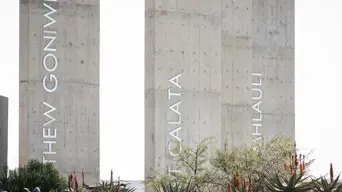Cradock Four inquiry: Lawyers, court representatives to visit Matthew Goniwe’s home
The inquiry was reopened in the court on Monday, with Judge Thami Beshe ruling that proceedings should continue despite hurdles in the legal representation of a former general in the defence force Joffel van de Westhuizen.

The Cradock Four memorial in Cradock, in the Eastern Cape. Picture: Fort Calata Foundation/Facebook
GQEBERHA - The home of anti-apartheid activist Matthew Goniwe will be visited by lawyers and representatives from the Gqeberha High Court as part of the inquiry into the deaths of the Cradock Four.
The inquiry was reopened in the court on Monday, with Judge Thami Beshe ruling that proceedings should continue despite hurdles in the legal representation of a former general in the defence force, Joffel van de Westhuizen.
ALSO READ: Cradock Four: Court hears that 49 persons associated with case have died
The South African National Defence Force (SANDF) declined his request for the payment of legal fees, a decision that he is appealing.
Goniwe, Fort Calata, Sparrow Mkhonto, and Sicelo Mhlauli died after being abducted by Special Branch police in 1985.
The Cradock Four inquiry will start with hearing evidence that does not implicate Van de Westhuizen until his legal representation is finalised.
On Tuesday, the court will lead a visit to the home of Goniwe, a teacher and anti-apartheid activist who was abducted and killed by apartheid Special Branch police.
His body was later burnt and then discovered days later before his funeral with his comrades, Calata, Mhlauli, and Mkhonto.
African National Congress (ANC) veteran and Goniwe’s friend, Mncedisi Nontsele, said he was in his late 20s at the time.
"This is about the families now because most of us may have said we have recovered but the families must find closure and they must be assisted to do that."
The court will be shown Goniwe’s home, which was surveilled by apartheid police during his activist times.
The visit will then move to the Cradock Four monument, which was opened in 2007.